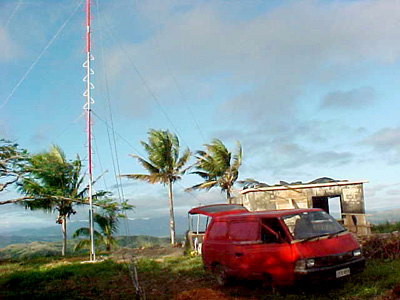 |
| High winds from Cyclone Evan buffet the FM repeater station in Sigatoka, Fiji, knocking it off the air. |
(Feb. 22, 2013 - by Ralph Kurtenbach and Harold Goerzen) Radio Light in Fiji is striving to regain its full voice with two of its broadcast sites standing silent two months after being knocked off the air by Tropical Cyclone Evan in mid-December.
"Before the storm hit, we had a coverage area with about 600,000 people," said Douglas Rose, who founded the stations. "With two of our [four] transmitting sites off the air, our coverage area is down to about 300,000 people." The stations-partners with HCJB Global-are operated by the Evangelical Bible Mission Trust Board, Fiji, an agency with which Douglas and his wife, Rose, serve as missionaries.
The ministry's two FM outlets in the capital city of Suva-Radio Light and the Hindi-language Radio Naya Jiwan (Radio New Life)-are back on the air as is the Internet station, Radio Nai Talai (Radio Messenger), streaming Fijian-language programs online.
However, the two Radio Light FM repeaters (at Sigatoka and Nadi/Lautoka) that cover the west side of the island of Viti Levu, are still off the air, leaving thousands of listeners without Christian programming. Douglas hopes the staff will get those two repeater stations fully back on the air in the coming weeks using temporary antenna towers.
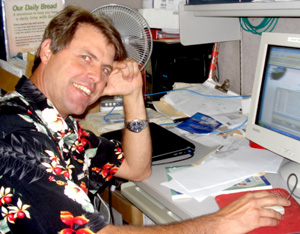 |
| Doug Rose, field director for Evangelical Bible Mission in Fiji, is currently on home ministry assignment in the U.S. |
When Fiji's electrical grid shut down, the radio stations, which share the same building, used diesel generators to operate. Once reconnected to the electrical grid, the ministry's computers and consoles were damaged by power surges.
The stations incurred more than $30,000 in damage to their studios and transmitting sites. The storm also caused an estimated $15,000 in damage to HCJB Global's partner station, Showers of Blessing, in Samoa.
The Fiji stations play primarily music, interspersed with teaching and short programs. Radio Light, the ministry's flagship station, broadcasts mainly in English but carries a few hours of daily programming in Hindi and Fijian. Programming is directed at Christians, especially those in positions of authority, whether in the family or the government.
Radio Naya Jiwan's (Hindi-language) target audience is those between the ages of 18 to 28 with many listeners asking questions about life and God. Less than 2 percent of Fiji's Indian population is considered to be Christian.
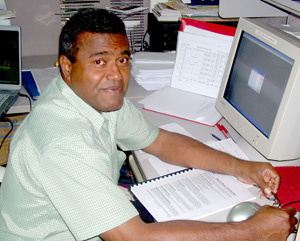 |
| Bulivou 'Buli' Bulanakawa, manager of Radio Light. |
Radio Nai Talai emphasizes revival among of Fiji's indigenous people, many who have become "nominal Christians," Douglas said, adding that there is a need to evangelize the youth. "Our mission is to cover the nation of Fiji with Christian radio in all three major languages," he related. "Our theme is, 'Till Christ comes' … and when He comes may He find us faithful."
In the intervening weeks since Evan's destruction, the functional broadcast sites continue to evangelize and teach with the stations' staff members learning something through the experience too. Bulivou "Buli" Bulanakawa, manager of Radio Light, said, "Many times we have been overburdened by the needs, but God has been teaching us to wait patiently for Him and His time to come through. He has proven Himself many times that way in providing people, technical help and finances when they were most needed."
"We were able to acquire almost free some replacement masts [towers] that would have cost us thousands of dollars," he continued. "Helping hands were lent to assist in our recovery. Some maintenance and repair work was freely given by people who came to know who we actually are as a radio station."
Douglas added that public infrastructure such as roads and bridges were damaged, hampering immediate access to affected areas, and Fiji's government declared a State of Natural Disaster for the country's northern and western divisions on Dec. 18. Reports say the western coast-home to the country's sugar cane and tourism industries-took the brunt of the cyclone's devastation. The Fiji Times reported that the nation's second-largest city, Lautoka, looked afterwards like a "war zone."
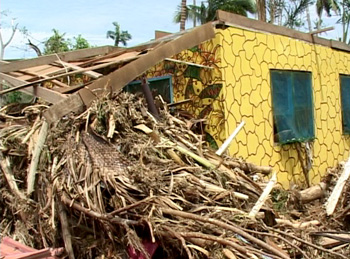 |
| Cyclone Evan caused major damage to buildings in Samoa. |
Evan's fierce winds, exceeding 173 mph, and heavy rains first struck Samoa, then circled the region, making devastating landfalls for more than a week before finally dissipating. Fiji, home to nearly 900,000 people, consists of more than 300 islands 1,300 miles northeast of New Zealand. The storm first appeared on Dec. 9 as a weak tropical depression about 400 miles from Fiji, but quickly gained strength, hitting Fiji as a category 4 storm. Evan, considered by some as the region's most powerful cyclone in 20 years, also killed four and destroyed thousands of homes on Samoa.
On Samoa, HCJB Global partner Showers of Blessing, which operates an FM station and Kingdom TV, saw its radio and television repeater stations at Mt. Fiamoe knocked off the air for five weeks. The repeaters lost power when Evan brought down electrical lines, according to Afeleti Lui, manager of the stations operated by the Worship Centre Church of Apia.
The storm came nearly three years after Cyclone Tomas and Cyclone Ului blasted HCJB Global's media partners on Fiji, Solomon Islands and Tonga in March 2010. At that time Douglas stood knee-deep in water in his home due to tidal surges, but thanked God for His protection and mercies. At Tonga that year, Willy Florian, the station manager, reported "some studio damage." By comparison, the 2010 cyclones packed more wind power than Hurricane Katrina which walloped New Orleans in 2005.
"The year 2012 [was] a rough one for Fiji," summarized Douglas, citing two major floods and Cyclone Evan. "This year will be an important one for Fiji as the country anticipates a return to democracy with a new constitution and plans for free elections in 2014."
Viewing Christian broadcasting as playing an integral role of strengthening the nation, Douglas referred to "a responsibility to get back on air where towers have been lost, bring our quality of sound up through new equipment in the studios and develop new sites to reach listeners in new areas."
"HCJB Global has really supported us in the past with engineers, getting equipment together, installations and training," related Douglas, a carpenter by trade who has served as a missionary for 24 years.
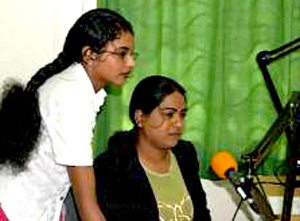 |
| Hindi radio programmers at the studios in Fiji. |
"Five or six times we've sent staff to [HCJB Global's former regional office] in Singapore," he added. "That training has been a real blessing-not only learning the technical aspects of broadcasting, but the spiritual side-learning how to produce programs that reach souls and how to follow up listeners." Douglas said he has a vision to expand the broadcasts to not only reach the entire nation of Fiji, but also other island nations in the region.
Dave Pasechnik, HCJB Global's vice president of global media, helped plant 35 partner radio stations in the South Pacific starting in the early 1990s. "I was very involved in the start-up work in this area and was the sub-regional director for the South Pacific for about five years," he wrote in his newsletter. "So to me this is somewhat personal; many working at the radio stations in Fiji and Samoa have become like family to us and yes, I feel we need to help our family when they are hurting."
He added that the partners in Fiji and Samoa are "both great examples of sustainable radio plants that have been very successful after we initially helped start them. But because of this cyclone they could use some help again from the outside. Fiji, especially, can become a mobilizing force in the future as they reach the Hindi population of Fiji (which is more than 400,000), and they are motivated to reach out as missionaries to India."
Anyone wishing to help the stations in Fiji and Samoa return to full functionality, broadcasting the gospel, can donate at www.hcjb.org/cycloneevan.
Source: HCJB Global
